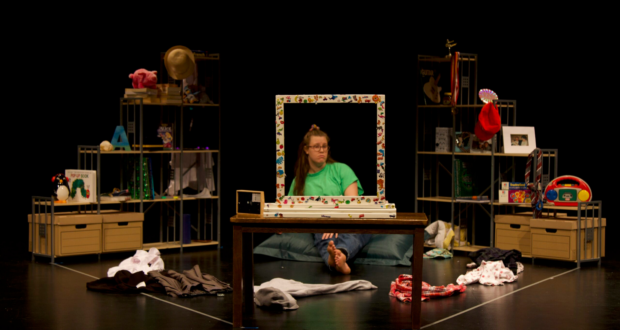Alice lays herself bare in this autobiographical show, and as a result, has the audience supporting her from the very beginning. Summary
Rating
Excellent
My knowledge of IVF and fertility treatments comes from TV shows and a couple of friends and family who have shared their own experiences. But it occurred to me, as Don’t Ask Don’t Get, Baby began, that my limited knowledge of the process and the emotional impact is only from a parent’s perspective. Stories are rarely from the perspective of a child conceived this way. It is this which makes Alice Underwood’s show such an eye-opener. Because this is Alice’s story, from being a small child and finding out what made her ‘different’, to her later battles in accepting that her Mum is not her biological mother.
Alice uses memories from her childhood to frame how she processed the news that, although her Mum gave birth to her, the egg itself was donated by another woman. The staging needs an early mention as Alice uses such effective techniques to take us through her childhood and her emotional journey. Despite limited costume and set changes, we instantly know we’re seeing Alice as a little girl snuggling under her blanket, or in-front of her mirror, trying to perfect the hairstyle of choice for a 14-year-old. Lighting and subtle changes to the location of furniture, or what’s on the shelves, help make this clear. Yet despite Alice doing all the moving of props herself, it is never distracting. Perhaps because Alice makes the audience feel so instantly comfortable in her presence, like sitting with a friend and a cup of tea, we don’t mind her re-arranging the room or changing her top whilst sharing her story.
The show explores her emotional journey as she grows up and learns more about her conception and where she came from. A particularly impactful scene shows Alice in a GCSE biology lesson, a harrowing experience for anyone if memory serves me correctly. But in this instance, they are reading about IVF in the textbook. As her unknowingly callous classmates talk through the topic, Alice becomes visibly distressed. This only increases when she’s in an A-Level Psychology class in which the teacher asks them to split the room in two, to debate nature vs. nurture. The use of pre-recorded sound, used throughout to give voices to her classmates and family, becomes particularly impactful here. As her fellow students make trivial comments that hit a nerve with Alice – her physical reactions can be difficult to watch.
It’s incredibly brave to put yourself out there on stage, especially if you’re telling your own story, and Alice is an incredible performer who shares a deeply personal story with us. It must be quite strange to perform to a live audience, plus a live stream, as The Space was doing for tonight’s performance, but this doesn’t at all faze Alice. As someone watching at home from a “ping” induced isolation, it was nice to hear the buzz of the theatre and to feel as though Alice was performing directly to the live stream as well as the in-person audience.
I won’t spoil the end of the show, but the closing words are jaw-droppingly beautiful. Despite being only 45 minutes long, this show has real impact. Alice shares her raw emotions with a room full of strangers, and for that, I’m certain, we are all grateful.
Written by: Alice Underwood
Directed by: Izzy Carney
Produced by: Happy Accident Theatre
Don’t Ask, Don’t Get, Baby plays live at the Space until 24 July. It will then be available on-demand to watch for a further two weeks. Further details and booking via the below link.
 Everything Theatre Reviews, interviews and news for theatre lovers, London and beyond
Everything Theatre Reviews, interviews and news for theatre lovers, London and beyond



